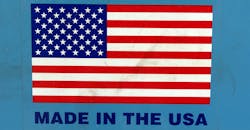I'm on a mission for truth, for objective fact. I'm out to understand the world around us—this industry and its infinite moving parts—and to tell that story to as wide an audience as I can.
We have a glimpse of truth here on IndustryWeek, packaged up in the IW U.S. 500. It's a long list of cold facts—hard data on the real-world performance of 500 of the top manufacturing companies in the country.
There's no arguing with the results: revenue, income, profits, margins—they were all up in 2017. In some cases, dramatically so.
That's good data; it's a real image of truth and reality. From there, though, the narrative falls apart.
Because, as we have learned from this whole digital revolution, data can only get you so far. You need analytics, you need context to understand the trends. And I can see where this story will go; I can see the comments coming in.
The data revealed two down years (2015-2016), followed by an absolutely solid 2017. The down years came on President Barack Obama's watch; the uptick came on President Trump's watch.
There will be those who will take it as absolute fact that the two soft years are due to restructuring and that the uptick was the result of the strong economy Obama left us. And there are those who will take it as absolute fact that the slump was due to Obama's anti-business agenda and the uptick is due to the pro-business Trump agenda. Neither of these statements is true. Neither is false. So much for facts.
In an effort to offset these interpretations, I sent the question deliberately to Krzysztof Bledowski, MAPI's council director and senior economist. His answer has stuck with me ever since:
Looking at this quote reminds me just how short-sighted we have become. It sometimes seems that, as a country, we are primarily motivated by quick wins and short-term gains. It seems that we have stopped considering the multiyear trends that drive progress. And with that, we have lost sight of the consequences of short-term thinking.
A year into President Trump's administration, half of us assume he has fixed everything that President Obama broke, half of us assume he has broken everything Obama fixed. Neither president could make or break our economy; neither president could fix or break our democracy. But they can certainly put a dent in both.
Perhaps that's why Bledowski's comments have stuck with me so strongly. I tend to follow the news of this industry, of our economy and everything that affects it, rather obsessively. In the process, I have become very well-acquainted with tariffs and trade disputes. I have followed the stories of the industries they are hurting, followed the financials of the industries they are helping, and I re-run the math in my head endlessly. And the math doesn't work out. The damage keeps outpacing the benefits.
And in the end, the whole plan seems to land back as another short-sighted strategy. Propping up steel is a good thing, and done well and with a mind for long-term gains, could benefit everyone. But as it stands, it seems like a quick win grab. It comes with a consequence to the entire manufacturing industry and, perhaps, the entire economy.
I honestly lose sleep over this issue. I struggle to see the strategy, I struggle to see the add. But I can't find it. All I can find is the damage being done, the impact to small and midsized companies that have stuck it out in America. And then I go back to Bledowski's comment, and I get out of my own short-sighted thinking. Economies cannot be undone by one president, by one deal, in 18 months.
So, with reluctance, I am able to pull my eyes away from trade and direct my attention to the systemic issues, the looming crisis that existed before this administration and will continue through it unless something is done: skills, jobs, and long-term growth.
The fight for trade is vital. But we can't lose sight of long-term struggles through short-term crises. Manufacturing—not as an industry, but as a movement, as an engine to democracy—can fight through these crises for the long-term win.
And that's the lesson from all of this, maybe. We must stay focused; we must be determined. We must resist the urge to chase short-term wins at the cost of the future.
About the Author
Travis Hessman
Content Director
Travis Hessman is the editor-in-chief and senior content director for IndustryWeek and New Equipment Digest. He began his career as an intern at IndustryWeek in 2001 and later served as IW's technology and innovation editor. Today, he combines his experience as an educator, a writer, and a journalist to help address some of the most significant challenges in the manufacturing industry, with a particular focus on leadership, training, and the technologies of smart manufacturing.
